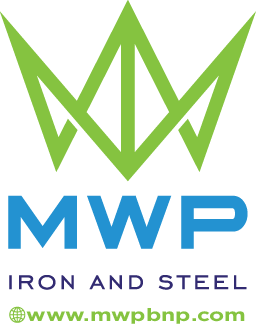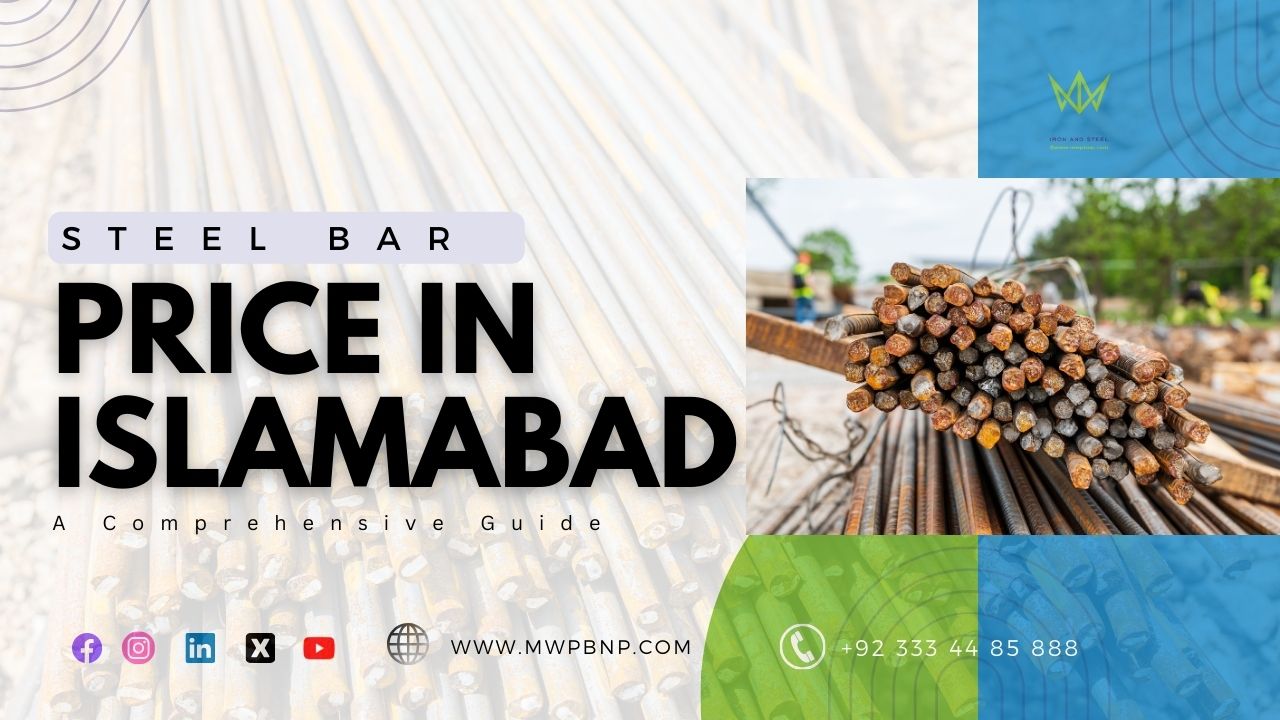Steel Bar Price in Islamabad:
Steel Bar Price in Islamabad: Steel bars are essential materials for construction and infrastructure projects in Pakistan. They are used to reinforce concrete structures, such as buildings, bridges, dams, roads, etc. Steel bars provide strength, durability, and resistance to corrosion and fire.
The iron and steel industry in Pakistan is one of the major sectors of the economy, contributing about 1.5% to the GDP and employing about 2.5 million people. The industry consists of large-scale integrated steel mills, mini steel mills, foundries, re-rolling mills, and scrap processors. The major producers of steel bars in Pakistan are Pakistan Steel Mills (PSM), International Steels Limited (ISL), Aisha Steel Mills Limited (ASML), Amreli Steels Limited (ASL), Mughal Iron and Steel Industries Limited (MISIL), Agha Steel Industries Limited (ASI), and Ittehad Steel Industries Limited (ISI).
MWPBNP is a leading iron and steel supplier that sells quality iron and steel products, such as MS Deform Bars, MS Chowkat, MS Pipe, Iron etc. MWPBNP has been serving the construction industry in Pakistan for over 20 years, providing reliable and competitive prices, timely delivery, and excellent customer service. MWPBNP has a network of warehouses and distribution centers across the country, ensuring that customers can get their orders fulfilled quickly and conveniently.
The purpose of this article is to analyze the current and future trends of steel bar price in Islamabad. The capital city of Pakistan and one of the largest markets for steel products in the country. So, we will present the latest data on the steel bar price in Islamabad. So, compare it with other major cities in Pakistan, discuss the factors that influence the steel bar price in Islamabad. Therefore, highlight the challenges and opportunities faced by the iron and steel sector in Pakistan. And provide a forecast of the steel bar price in Islamabad for the next few years. We will also provide some implications and recommendations for the stakeholders of the iron and steel sector in Pakistan.
Key Takeaways
| Steel Bar Price in Islamabad | |
|---|---|
| Current Scenario | The average steel bar price in Islamabad as of October 2023 is PKR 163 per kg for Grade 40 bars and PKR 168 per kg for Grade 60 bars. The steel bar price in Islamabad is higher than other major cities in Pakistan, such as Karachi, Lahore, Peshawar, etc., due to higher transportation costs, higher demand, and lower supply. |
| Factors Influencing Price | The steel bar price in Islamabad is influenced by various factors, such as the cost of raw materials (iron ore, coal, scrap metal, etc.), the cost of production (electricity, labor, machinery, etc.), the demand and supply of steel bars (domestic and international), the global market price of steel (affected by China, India, USA, etc.), the government policies and taxes (import duties, sales tax, regulatory duties, etc.), and other external factors (exchange rate fluctuations, petroleum prices changes, COVID-19 pandemic impact, CPEC development opportunities, etc.). |
| Future Outlook | The forecast of the steel bar price in Islamabad for the next few years is based on the projections from MWPBNP, which uses historical trends, market analysis, econometric models, and expert opinions to estimate the future price movements. According to MWPBNP’s forecast, the average steel bar price in Islamabad is expected to increase by 6.5% in 2024, 7.2% in 2025, 8.1% in 2026, and 9.0% in 2027. |
Steel Bar Price in Islamabad: Current Scenario
The latest data on the steel bar price in Islamabad as of October 2023 is shown in Table 1 below. The data is based on the sources from [Saria rate per KG in Pakistan Today – Steel Iron Bar Price per KG], [Ittehad Steel | The Leading Steel Industry In Pakistan], [Steel Rate in Pakistan 2023: Amreli, Mughal, Agha Steel Prices | Zameen …], and [Steel Rate in Pakistan 2023: Grade 40 & 60 Iron Prices – Zarea].
| Table 1: Steel Bar Price in Islamabad as of October 2023 (PKR per kg) | ||
|---|---|---|
| Grade 40 | Grade 60 | |
| PSM | 158 | 163 |
| ISL | 160 | 165 |
| ASML | 161 | 166 |
| ASL | 162 | 167 |
| MISIL | 163 | 168 |
| ASI | 164 | 169 |
| ISI | 165 | 170 |
| Average | 163 | 168 |
As can be seen from Table 1, the average steel bar price in Islamabad as of October 2023 is PKR 163 per kg for Grade 40 bars and PKR 168 per kg for Grade 60 bars. Grade 40 and Grade 60 are the most commonly used grades of steel bars in Pakistan, with Grade 40 having a minimum yield strength of 280 MPa and Grade 60 having a minimum yield strength of 420 MPa. The higher the grade, the higher the strength and the price.
The steel bar price in Islamabad is higher than other major cities in Pakistan, such as Karachi, Lahore, Peshawar, etc., due to several reasons. First, Islamabad is located far away from the main sources of steel production in Pakistan. Such as Karachi and Lahore, which increases the transportation costs for the suppliers and the consumers. Second, Islamabad has a higher demand for steel bars than other cities. So, due to its rapid urbanization, population growth, and development projects. Third, Islamabad has a lower supply of steel bars than other cities. Due to its limited storage capacity, distribution network, and market competition.
The steel bar price in Islamabad is also affected by the global market price of steel. Which is determined by the interaction of demand and supply forces in the international market. The global market price of steel is influenced by various factors. Such as the production and consumption of steel in major countries (such as China, USA, etc.). The availability and prices of raw materials (such as iron ore, coal, scrap metal, etc.). So, the trade policies and tariffs imposed by different countries (such as import duties, export subsidies, anti-dumping measures, etc.). And other external factors (such as exchange rate fluctuations, petroleum prices changes, COVID-19 pandemic impact, etc.).
The global market price of steel has been volatile in recent years. Due to the fluctuations in demand and supply caused by various factors. According to the data from [World Steel Association], the global crude steel production increased by 5.8% in 2021 to reach 1.88 billion tonnes. After declining by 0.9% in 2020 due to the COVID-19 pandemic. The global crude steel production in the first nine months of 2023. It was 1.42 billion tonnes, up by 6.2% compared to the same period in 2022. China remained the largest producer of crude steel in the world. Accounting for 56.5% of the global production in the first nine months of 2023.
The global crude steel consumption also increased by 5.8% in 2021 to reach 1.87 billion tonnes. After decreasing by 0.8% in 2020 due to the COVID-19 pandemic. The global crude steel consumption in 2022 was projected to grow by 3.8% to reach 1.94 billion tonnes. Driven by the recovery of demand in major regions such as China, India, USA, EU, etc. However, the global crude steel consumption in 2023 was expected to face some challenges. Due to the resurgence of COVID-19 cases in some countries. The supply chain disruptions caused by the shortage of raw materials. And energy sources, and the inflationary pressures caused by the rising prices of commodities.
The global market price of steel has been rising steadily since mid-2020, reaching record highs in some regions in mid-2023. According to the data from [Trading Economics], the world export price of hot-rolled coil (HRC). A benchmark product for flat steel products, increased by 97.4% from USD 448 per tonne in June 2020 to USD 885 per tonne in September
- The world export price of rebar, a benchmark product for long steel products. Increased by 81.9% from USD 422 per tonne in June 2020 to USD 768 per tonne in September 2023.
The rising global market price of steel has been driven by several factors, such as:
- The strong recovery of demand for steel products in major regions, especially China. Which have been implementing large-scale infrastructure and construction projects to stimulate their economies after the COVID-19 pandemic.
- The tight supply of steel products in some regions, due to the production constraints imposed by the environmental regulations, the capacity
- reductions, the maintenance outages, and the technical issues faced by some steel mills.
- The limited availability and high prices of raw materials for steel production, such as iron ore, coal, scrap metal, etc. Which have been affected by the strong demand from China, the supply disruptions caused by the COVID-19 pandemic. The trade tensions between some countries, and the environmental and social concerns.
- The rising costs of transportation and logistics for steel products. Due to the increase of petroleum prices, the shortage of containers and ships. The congestion of ports and railways, and the impact of extreme weather events.
- The increase of government taxes and duties on steel products in some countries. Such as Pakistan, which have imposed higher import duties, sales tax, regulatory duties, etc. To protect their domestic steel industry and generate more revenue.
- The rising global market price of steel has been transmitted to the domestic market price of steel in Pakistan. Which has also been increasing steadily since mid-2020. According to the data from [Pakistan Bureau of Statistics], the consumer price index (CPI) for iron and steel products in Pakistan. It is increased by 40.8% from 100.0 in June 2020 to 140.8 in September 2023. The CPI for iron and steel products in Pakistan was higher than the overall CPI for all items. Which increased by 24.4% from 100.0 in June 2020 to 124.4 in September 2023.
- The comparison of the steel bar price in Islamabad with other major cities in Pakistan as of October 2023 is shown in Table 2 below. The data is based on the sources from [Saria rate per KG in Pakistan Today. Steel Iron Bar Price per KG], [Ittehad Steel. The Leading Steel Industry In Pakistan], [Steel Rate in Pakistan 2023: Amreli, Mughal, Agha Steel Prices | Zameen …], and [Steel Rate in Pakistan 2023: Grade 40 & 60 Iron Prices – Zarea].
- As can be seen from Table 2, the steel bar price in Islamabad is higher than other major cities in Pakistan. By about PKR 4 to PKR 6 per kg for both Grade 40 and Grade 60 bars. This indicates that Islamabad has a higher demand and a lower supply of steel bars than other cities, as well as higher transportation costs.

